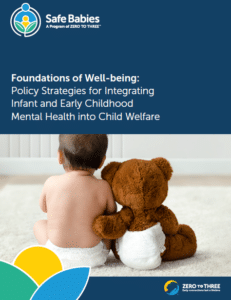Key Findings
From ZERO TO THREE’s The Basics of Infant and Early Childhood Mental Health: A Briefing Paper Examples of how mental health concerns can present in children from birth to age 3:
- Chronic eating or sleeping difficulties
- Inconsolable “fussiness” or irritability
- Incessant crying, with little ability to be consoled
- Extreme upset when left with another adult who is not the primary caregiver
- Inability to adapt to new situations
- Easily startled or alarmed by routine events
- Inability to establish relationships with other children or adults
- Excessive hitting, biting, or pushing of other children, or very withdrawn behavior
- Flat affect (showing little to no emotion at all)
- Refusal of comfort from caregivers



